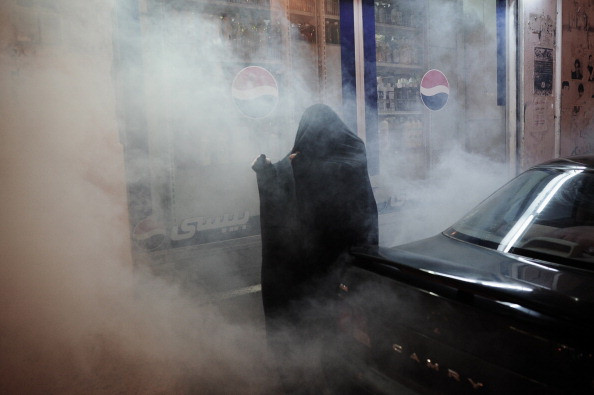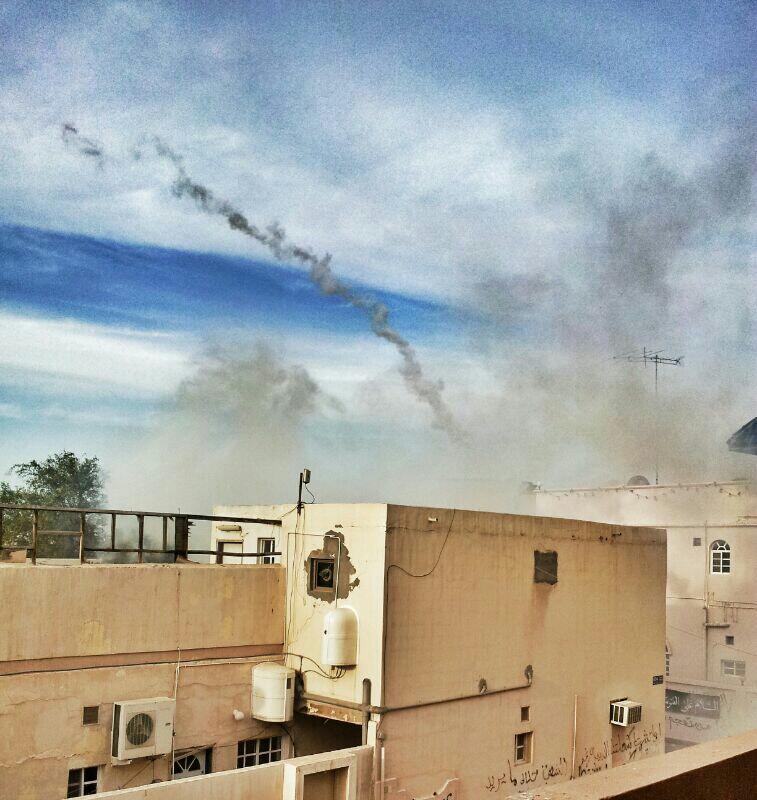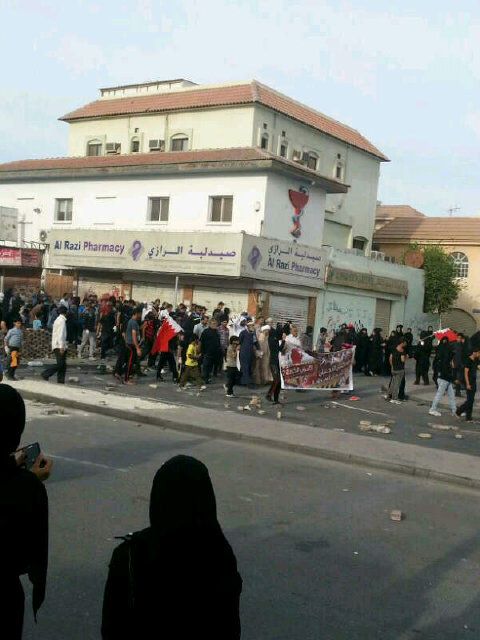Children withstand the Hamad’s miserable tyranny over Bahrain
March 14, 2013 No Comments
Revolution Unstoppable, withstands Saudi Invasion, US Silence, Int’l Apathy, al Khalifa Brutality
March 14, 2013 No Comments
Dignity Strike II – Birdshot in Bahrain, brutal repression continues unchecked
March 14, 2013 No Comments
Arab Women’s Activism defies Western Stereotypes of Disempowerment, Submissiveness
In sideline panel events at the 57th Commission on the Status of Women, talk was of working for further transformation in everything from the Egyptian constitution to the safety of women throughout the uprisings
Arab Women Say Time for Saying ‘Spring’ Is Over
By Hajer Naili – WeNews – 14 March, 2013
UNITED NATIONS (WOMENSENEWS)–Egyptian female activists are looking for a better constitution and members of the Syrian opposition are concerned about the violence committed by all sides of that conflict against women.
Worsening violence against women in Tunisia is also troubling.
The long and difficult process of democratization is causing many Arab women to seek new ways to describe what their region–and the women in them–are going through.
They reject the term “Arab Spring” and instead use the words “revolution” and “uprisings.”
“What we have witnessed, you cannot call it an Arab Spring,” said Zahra’ Langhi, a gender specialist and political activist from Libya. “The term was coined in the West and imposed on our reality. Whereas if you say it’s a revolution, an uprising, it means it’s a transformation.”
Last week the 57th Commission on the Status of Women began at U.N. headquarters. Violence against women is the overall theme of this year’s two-week-long event.
Karama, an Egypt-based organization working to end violence against women across the Middle East and North Africa, helped host media panels for Arab women at the conference, in conjunction with Equality Now, the New York-based group advocating for the human rights of women and girls around the world.
Along with Langhi, Mervat Tallawy, president of the Cairo-based National Council for Women, was among those invited to New York to speak.
March 14, 2013 No Comments
Bahrain Repression Round-up
March 14, 2013 No Comments
Hightech greed allows wholesale abuse of privacy by Human Rights absuing Regimes
Researchers Find 25 Countries Using Surveillance Software
By NICOLE PERLROTH – Huffington Post – 14 March, 2013
Last May, two security researchers volunteered to look at a few suspicious e-mails sent to some Bahraini activists. Almost one year later, the two have uncovered evidence that some 25 governments, many with questionable records on human rights, may be using off-the-shelf surveillance software to spy on their own citizens.
Morgan Marquis-Boire, a security researcher at Citizen Lab, at the University of Toronto’s Munk School of Global Affairs, and Bill Marczak, a computer science doctoral student at the University of California, Berkeley, found that the e-mails contained surveillance software that could grab images off computer screens, record Skype chats, turn on cameras and microphones and log keystrokes. The word “FinSpy” appeared in the spyware code. FinSpy is spyware sold by the Gamma Group, a British company that says it sells monitoring software to governments solely for criminal investigations.
Now, one year later, Mr. Marquis-Boire and Mr. Marczak have found evidence that FinSpy is being run off servers in 25 countries, including Ethiopia and Serbia, without oversight.
Until Mr. Marquis-Boire and Mr. Marczak stumbled upon FinSpy last May, security researchers had tried, unsuccessfully, for a year to track it down. FinSpy gained notoriety in March 2011 after protesters raided Egypt’s state security headquarters and discovered a document that appeared to be a proposal by the Gamma Group to sell FinSpy to the government of President Hosni Mubarak .
Martin J. Muench, a Gamma Group managing director, has said his company does not disclose its customers but that Gamma Group sold its technology to governments only to monitor criminals. He said that it was most frequently used “against pedophiles, terrorists, organized crime, kidnapping and human trafficking.”
But evidence suggests the software is being sold to governments where the potential for abuse is high. “If you look at the list of countries that Gamma is selling to, many do not have a robust rule of law,” Mr. Marquis-Boire said. “Rather than catching kidnappers and drug dealers, it looks more likely that it is being used for politically motivated surveillance.”
As of last year, Mr. Marquis-Boire and Mr. Marczak, with other researchers at Rapid7, CrowdStrike and others, had found command-and-control servers running the spyware in just over a dozen countries. They have since scanned the entire Internet for FinSpy. …more
March 14, 2013 No Comments
Hamad gives Crown Prince “role” in existential bid to redeem pretense of reform in Bahrain
Bahrain crown prince given political role
11 March, 2013 – by Simeon Kerr – Zawya
Bahrain’s crown prince, Sheikh Salman bin Hamad Al Khalifa, has been appointed first deputy prime minister in a move that could bolster reform in the strife-torn island state.
King Hamad bin Issa Al Khalifa appointed his eldest son first deputy prime minister for the development of the performance of the executive authority’s bodies. He will join four other deputy prime ministers.
The reformist crown prince’s move into a frontline political role comes amid a violent crackdown on dissent led by the majority Shia community, which has been driven by hardliners within the ruling family.
Observers said the crown prince’s new position reflected a realisation that reform of government institutions will have to accompany a focus on security that has prevailed over the past couple of years.
The crown prince remains junior to his great-uncle, the 74-year-old prime minister, Sheikh Khalifa bin Salman al-Khalifa.
Premier for more than 40 years, Sheikh Khalifa personifies the status quo that pro-democracy protesters have been trying to change. But most of the large Sunni minority lauds him as a figurehead representing their interests.
The crown prince’s appointment came as dialogue limps on between the opposition, government and pro-government loyalists.
Progress in the talks, which began last month, has been slow and the parties are still negotiating the agenda.
But optimism for dialogue has been growing since Saudi Arabia, Bahrain’s strongest ally, started increasing pressure for a political solution in the island state to prevent any further spillover of unrest among the Shia of its oil-rich Eastern Province.
The killing of some protesters has caused street protests to flare, complicating the negotiations. Radical Shia youth elements reject any dialogue with the government, which they blame for repression.
Diplomats are pleased that none of the parties has quit the talks. Al-Wefaq, the main Shia opposition group, walked out of the last round of dialogue in July 2011, as it was outnumbered by loyalist groups.
The crown prince led private talks with the opposition during the height of the unrest in 2011. But the opposition failed to accept his proposals before Saudi Arabia led Gulf troops across the causeway that joins the two countries, leading to months of violent repression of pro-democracy protesters.
The crown prince has since lost the support of much of the Sunni minority, which blames him for negotiating with activists who have since been jailed on charges of trying to overthrow the government.
However, Sheikh Salman has played a behind-the-scenes role promoting reform initiatives, such as the appointment of an independent inquiry that slammed the security forces for excessive use of violence and systematic torture during the crackdown.
Sheikh Salman is expected to focus on reforming the government from within. “The crown prince now has an institutionalised role in politics,” said Doha-based political analyst Justin Gengler. …source
March 14, 2013 No Comments
Strike of Dignity II, Paralyzes Bahrain, Security Forces Respond with Violence
“Strike of Dignity-2” Paralyzes Bahrain, Security Forces Respond Violently
Local Editor – 14 March, 2013
Strike of DignityBahrain revived on Thursday the second anniversary of the Saudi forces’ entrance to the country to assist the monarchy in oppressing the anti-regime protests that took off on the 14th of February.
Bahraini people held a general strike on this occasion, in response to the Bahraini opposition’s call for “Strike of Dignity-2”, and took to the streets in peaceful protests in over 50 cities and villages.
Protests took place in the capital, Manama, A’ali, Bani Jamrah, Al-Hajar, Al-Musalla, Setra, Bouri, Al-Akar, Maqsha, Jid Hafs, Abu Saiba, Karana, and other places.
Protestors demanded the withdrawal of the Saudi foinjured Bahrainirces which they referred to as “occupation”, and the prosecution of members who committed violation against Bahraini citizens.
In contrast, the Bahraini security forces faced demonstrations by firing toxic bombs and internationally banned shotguns at protestors, causing casualties among them.
Al-Manar correspondent in Bahrain reported that one young man in Abu Saiba was severely injured from the shotgun, while Ali Rida (18 years old) was arrested by mercenaries, while he was standing on a house roof in Al-Deir village.
Saudi statementHowever, the Bahraini Foreign Ministry said on Twitter that one “saboteur” was injured after he fell off the roof of a house in Al-Deir, and was taken to the hospital.
Other protestors were also wounded in Abu Saiba, Jidd Hafs, and Ma’ameer when they were targeted by fissile weapons, while videos broadcast on the internet showed armored vehicles running over protestors in Al-Akar.
In this context, the Saudi Foreign Ministry called on its citizens to stay away from regions of strike and public gatherings, stating on its Twitter account that “due to the strikes in the brotherly Kingdom of Bahrain, the Foreign Ministry calls on its citizens to be cautious and to stay away from regions of strike and gatherings.” …more
March 14, 2013 No Comments
UN High Commissioner Navanethem Pillay on Human Rights in Bahrain
March 14, 2013 No Comments
Bushra Al Hendi on Human Rights in Bahrain
March 14, 2013 No Comments
Dr. Nada Dhaif on Human Rights in Bahrain
March 14, 2013 No Comments



































